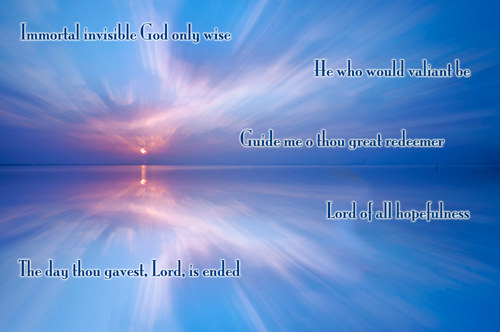The day thou gavest, Lord, is ended
Written by: John Ellerton (1826-93) a Cheshire vicar.
Music tune: St Clement composed by Revd Clement Scholefield [1839-1904], who was a great friend of Sir Arthur Sullivan (of Gilbert and Sullivan fame), and some think he had a hand in the writing of the waltzing tune.
It has five verses (verses 3 or 4 can be cut). The phrases are well written and celebrate the triumphant hope that God’s kingdom stands and grows for ever. This hymn has often topped the charts in the BBC's Songs of Praise poll.
Famous uses:
- Queen Victoria used this for her Diamond Jubilee
- It is the official evening hymn of The Royal Navy and The Royal Australian Navy
- Rick Wakeman used the tune as the theme for Anne Boleyn in his 'concept' album The Six Wives of Henry VIII in 1973
He who would valiant be (To be a pilgrim)
Written by: John Bunyon (1628–1688) and first appeared in Pilgrim's Progress in 1684; the words were modified in 1906 for The English Hymnal by Percy Dearmer. It is based on Hebrews 11:13
The tune is: Monks Gate: nothing to do with monks but it was a folk song heard at Monk's Gate Sussex by Ralph Vaughan Williams who adapted it for the hymn.
It has 3 verses, the sentiment being that pilgrims are bold, valiant, undaunted by trial and trouble, and their home undimmed by disappointment and earthly failure. A popular upbeat funeral hymn
Famous uses:
- Lady Thatcher's funeral
- It is the school hymn for several Grammar schools including the Royal Grammar school, Guildford
- Used in two Doctor Who episodes in 2007
Lord of all hopefulness
Written by: Joyce Torrens (1901-53), who wrote under the name of Jan Struther, famous for a newspaper column in which she presented herself in the character of Mrs Miniver, a briskly sensible and humorous middle-class woman whose spirit seemed to embody a certain sort of plucky Englishness.
The Hymn was written in 1929 on requested by from Westminster Abbey.
The tune: is an Irish melody Slane and suits the words beautifully.
It has 4 verses with a meaningful message, and the tune is typically Irish in its range and ending on three repeated notes. This hymn brings comfort without sadness when used at a funeral.
Immortal, invisible, God only wise
Written by: Walter Chalmers Smith, based on 1 Timothy 1:17;
Muisc: Welsh tune of St Denio.
This hymn is one of general praise and recognition of God as unchanging and as light. There are 4 verses and some choose to omit verse 3 if time is short.
The tune is easy to follow if you don't already know it, and sits well during the service.
Famous uses:
- Queen Elizabeth, the Queen Mother's funeral
Guide me o thou great redeemer (Cwm Rhondda)
Tune by: John Hughes(1873-1932),
Written by: William Williams in 1905 original lyrics in Welsh, then translated to English because of the large number of industrial workers who had migrated to Rhondda and spoke no welsh.
The tune is indelibly associated with Welsh Male Voice Choirs and Eisteddfods.'Cwm Rhondda' has been sung in the trenches and mines as well as at numberless rugby matches, was composed for a singing festival.
The hymn text refers to the journey of a Christian throughout their life on earth requiring the Redeemer's guidance and ending at the gates of Heaven (the verge of Jordan) and end of time (death of death and hell's destruction).
Famous uses:
- Queen Elizabeth, the Queen Mother's funeral
- Diana, Princess of Wales's funeral
- Prince William and Catherine Middleton's Wedding
- Featured in the film 'How green was my valley'
It's an uplifting funeral hymn, suitable as a recessional and I must admit one of our favourites. Should you want it or any others sung at a funeral, give us a call.
Have a listen to the hymns.


 RSS Feed
RSS Feed
